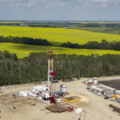The Canadian economy grew at an annual rate of 3.3 percent in the second quarter of 2022, but Wednesday’s GDP data also contained some clear warning signs about trouble ahead.
Canada’s GDP growth was well behind the Bank of Canada estimate of four percent and a full percentage point behind the consensus estimate of 4.4 percent provided by analysts.
Although the threat of a recession is real, Canadians shouldn’t get too hung up on the term, said Philip Cross, a senior fellow at the Macdonald-Laurier Institute.
“The point is the economy is going to be much slower than it used to be and the housing market is going to be much weaker,” said Cross.
The economic slowdown comes in response to central bank moves to throttle rising prices in the West and Cross said he expects the Bank of Canada will continue to hike interest rates, even after an expected rate increase in September.
“The only thing that’s going to affect monetary policy is if the underlying inflation comes down,” said Cross. “(A potential recession) is not the Bank of Canada’s problem.”
The global factors pushing inflation to record highs are also showing some resiliency. The Russian invasion of Ukraine continues to drag on, sparking an energy crisis in Europe and pushing prices higher. Germany is experiencing its highest inflation rate in 50 years at 8.8 percent and some analysts are predicting that the eurozone inflation rate could hit 10 percent this year.
Cross said that runaway inflation is a far more serious problem than a potential recession caused by central bank tightening.
“Higher prices are affecting almost all Canadians. The threat of recession is a threat to a smaller share of Canadians,” said Cross.
The Bank of Canada has also raised concerns that wage hikes in response to rising prices could cause an inflationary spiral. Cross said that’s a real possibility, especially with Canada’s unemployment numbers at record lows.
Statistics Canada reported that Canada saw 0.8 percent GDP growth in the second quarter, with a 0.1 percent decline in July, which could be the first sign of stalled growth due to rising interest rates.
With the July data “pointing to a weak start to the third quarter and the housing market slowing sharply, the Bank’s job is going to get a lot harder going forward,” wrote Randall Bartlett, the senior director of Canadian economics at Desjardins.
“Given ongoing strength in wage growth and high inflation, we continue to expect the Bank to act forcefully at next week’s meeting by hiking rates 50 basis points,” wrote Bartlett.
On the positive side, air travel and hospitality have seen significant gains, with the federal government lifting vaccine mandates for domestic travel and pausing random COVID-19 testing for international travellers.
Air travel jumped 5.6 percent in June, and has more than doubled since the beginning of the year, although the industry as a whole is still 40 percent below pre-pandemic levels. And a sure sign that Canadians are trickling back into the office came with the news that urban transit systems rose 2.3 percent, which is the fifth consecutive month of growth.
Cross said the Bank of Canada will be encouraged by the housing data released on Wednesday, which shows a marked decrease from the dizzy heights of the pandemic. Interest rate hikes caused a decline in business for real estate agents and brokers, which dropped 5.3 percent in June, the fourth consecutive month of declines.
In July, the Bank of Canada projected that inflation would decline to three percent by the end of 2023 and return to two percent by the end of 2024.
Recommended for You

‘Immense horror’: Iranian regime marks 47 years of Islamic rule amidst mass killings of protestors

‘Election fever?’: Hub Politics on if Canadians will be headed to the polls this spring

‘The most important geopolitical resource we have’: Why the world still needs Canada’s oilsands

Mark Carney is undoing Justin Trudeau’s legacy: 15 policy reversals from his first year in power



